The Deepest Furrow – Jonathan Wood
MOUNT ABRAXAS 2019
My previous reviews of this author here: https://nullimmortalis.wordpress.com/2013/03/06/the-new-fate-by-jonathan-wood/ & https://dflewisreviews.wordpress.com/tag/jonathan-wood/ and of this publisher here: https://dflewisreviews.wordpress.com/complete-list-of-zagava-ex-occidente-press-books/
When I read this book, my thoughts will appear in the comment stream below…
8 thoughts on “The Deepest Furrow – Jonathan Wood”
Possible spoilers
Pages 40 – 60
This book now becomes very powerful and these sections force you to read them in one fell sitting. The spell is truly broke, the ink (as well as the pig blood and dung) beyond any blotter’s capacity, I guess. Who is that insidious girl? The man in the room upstairs with a bubble of saliva permanently hanging. And the train’s return for me, with explicitly metal hawling equipment, “gleaming metal frames”, aboard as well as a man who makes you complete the journey, as I have just done with this book. No memories of my own grandmother left. And even more diminuendo word patterns. I deleted the diminuendo pattern yesterday that I originally reproduced in my review above, as I thought it cruel to do so. But now this book has been cruel to me. Landed me with a bleeding buck on my shoulders. So here it is again. You see, no matter, because they are “bare furrowed fields”, as these sections attest, and I’m “hunted like a boar”, too.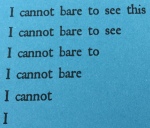 And nobody cares about me, anyway, and nobody has a cosy spluttering fire lit for me when I get home, “Jahddidi, lahdiddi, fahddiih,…” but, still, I recognise it is also a serious work of social history, about the nature of superiority and inferiority, and the false claims of certain perceived heavens on earth, Eschatons falsely immanentised…
And nobody cares about me, anyway, and nobody has a cosy spluttering fire lit for me when I get home, “Jahddidi, lahdiddi, fahddiih,…” but, still, I recognise it is also a serious work of social history, about the nature of superiority and inferiority, and the false claims of certain perceived heavens on earth, Eschatons falsely immanentised…
“These are not my thoughts.”
Pages 40 – 60
This book now becomes very powerful and these sections force you to read them in one fell sitting. The spell is truly broke, the ink (as well as the pig blood and dung) beyond any blotter’s capacity, I guess. Who is that insidious girl? The man in the room upstairs with a bubble of saliva permanently hanging. And the train’s return for me, with explicitly metal hawling equipment, “gleaming metal frames”, aboard as well as a man who makes you complete the journey, as I have just done with this book. No memories of my own grandmother left. And even more diminuendo word patterns. I deleted the diminuendo pattern yesterday that I originally reproduced in my review above, as I thought it cruel to do so. But now this book has been cruel to me. Landed me with a bleeding buck on my shoulders. So here it is again. You see, no matter, because they are “bare furrowed fields”, as these sections attest, and I’m “hunted like a boar”, too.
 And nobody cares about me, anyway, and nobody has a cosy spluttering fire lit for me when I get home, “Jahddidi, lahdiddi, fahddiih,…” but, still, I recognise it is also a serious work of social history, about the nature of superiority and inferiority, and the false claims of certain perceived heavens on earth, Eschatons falsely immanentised…
And nobody cares about me, anyway, and nobody has a cosy spluttering fire lit for me when I get home, “Jahddidi, lahdiddi, fahddiih,…” but, still, I recognise it is also a serious work of social history, about the nature of superiority and inferiority, and the false claims of certain perceived heavens on earth, Eschatons falsely immanentised…“These are not my thoughts.”
Dear Des,
My grateful thanks for shadowing this blooded narrator and suffering the blows. I simply had to write it and when I had written it, rather in the same way as The New Fate, I barely knew where I had been for the time it had taken; the story awaited me in lowly stables barely recognisable. A compelling undercurrent drove me to compose The Deepest Furrow and in your reference to the cruelty of deleting the diminuendo, there’s the rub that stands for itself. Everywhere today the petty cruelty falls about us like dust; petty cruelties that lead to bigger ones. As an aside, these diminuendos were also the rhythm of the train’s movement as the tale went from youth to desperate age into fate…. The New Fate…and in the acknowledgments to those who disappeared. The Furrow as the middle journey to the end. I became engulfed until my study walls fell away and the village appeared. It leaves me to give very considerable thanks to Dan Ghetu for his faith in my writings and his ingenuity in realising this work on the page and to Matúš Ďurčík for his very fine images. I also thank T. Allan for his insight into this savage environment that is devoid of idyll. Your reviewed journey, Des, is haunted/haunting in murmuring woods.
Jonathan Wood
London May 31st 2019
My grateful thanks for shadowing this blooded narrator and suffering the blows. I simply had to write it and when I had written it, rather in the same way as The New Fate, I barely knew where I had been for the time it had taken; the story awaited me in lowly stables barely recognisable. A compelling undercurrent drove me to compose The Deepest Furrow and in your reference to the cruelty of deleting the diminuendo, there’s the rub that stands for itself. Everywhere today the petty cruelty falls about us like dust; petty cruelties that lead to bigger ones. As an aside, these diminuendos were also the rhythm of the train’s movement as the tale went from youth to desperate age into fate…. The New Fate…and in the acknowledgments to those who disappeared. The Furrow as the middle journey to the end. I became engulfed until my study walls fell away and the village appeared. It leaves me to give very considerable thanks to Dan Ghetu for his faith in my writings and his ingenuity in realising this work on the page and to Matúš Ďurčík for his very fine images. I also thank T. Allan for his insight into this savage environment that is devoid of idyll. Your reviewed journey, Des, is haunted/haunting in murmuring woods.
Jonathan Wood
London May 31st 2019

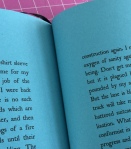
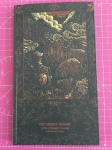
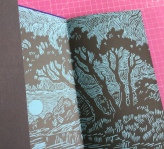

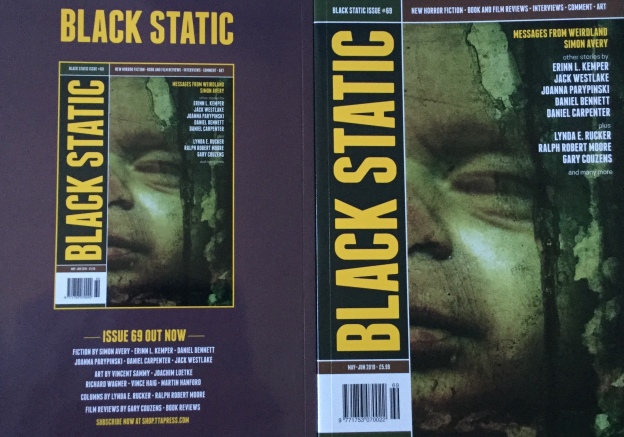
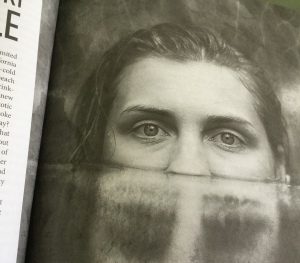
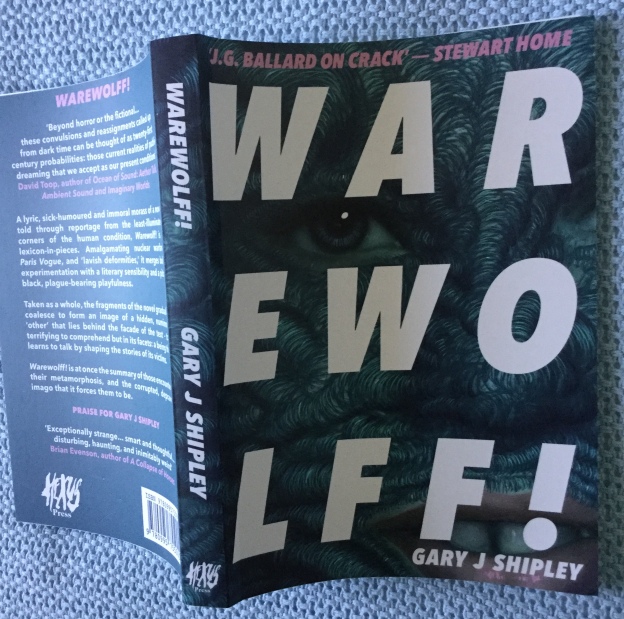
 I was convinced I had seen the word “Warewolff!” before, and I was right. There are two quotes at the beginning of this book, and this word is in one of them. From FINNEGANS WAKE. My twelve page review of this wonderful book is linked below:-
I was convinced I had seen the word “Warewolff!” before, and I was right. There are two quotes at the beginning of this book, and this word is in one of them. From FINNEGANS WAKE. My twelve page review of this wonderful book is linked below:-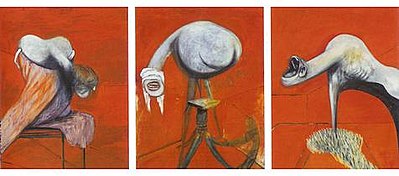
Obviously this book is beautiful, and it handles sturdily, too. Over 60 pages; my copy numbered 15/100. All the pages the same colour paper.
Pages 7 – 11
The narrator on a steam train, his head out the window in the idyllic air, a narrator with “young arms” and a propensity to draw up diminuendo word games from what people say, dreaming of his beloved grandmother (as I often do, too), even on a train, because it stops for a while, able to join those with rutted hands and grandmothers still with full bosoms, some picnicking on apples as big as fists…
What an entrancing start to this journey. I dare not read more in case it breaks the spell…
“My ink blotter is riddled with idle scribbles and small caricatures…”
And I dabble or doodle, thereon, my extrapolations from the previous first few pages of this work, extrapolations on how perfectly idyllic the plot remains towards a happy ever after ending that I originally expected to reach.
I enjoy telling lies. But truth is stronger, not necessarily stranger, than fiction, and the truth of THIS fiction remains perfectly told. Anything I tell you about the plot itself would be a spoiler. Do blotters have creases or even furrows scored?
“; a dream of being inside a toy train waiting to be drawn onto the last journey with its final station.”
I am truly captivated by this journey, once youthful idyllic memories transported by a blend of today’s past and present self (“the bottoms of my trousers” not rolled but wet, and it suddenly occurs to me that these pages seem like perfectly cut shapes of blue blotting paper), today’s self leaving the city in my trilby and my suitcase lifted from the train, returning to another forest enclave where someone’s grandmother, if not mine, and others, welcome me. A room of my own.
“It was as if this had all been planned and written down…”.
“The furrows began to appear, as if they were in a poem, folding out and over onto the land and with it, from out the gaping bowels of each horse, a deluge of dung falls…”
The narrator, now away from the city’s conformism and his Superior overseeing his tedious job, becomes — sleeping in a hay wain or, rather, a novella’s hovel near horses, susceptible to kicks awake — part of some rhythm, some quasi-William Morris or Dürer communion with dung and timelessness, blood swirls to deck the top of soup, and we with him. An “inner glory.” A share of ploughing. Amid motley-minded characters to boot.
“…perhaps it was my ‘city’ mentality coming out on me again that allowed me to ask such questions to the vacant and dead audience in my head.”
And to question you as a similar audience (!) whether recently in my reviews a character draped himself with a dead deer, as the narrator does here with a buck after it being shot by an arrow. I usually find my own cross-references but this one has defeated me. Meanwhile, we follow the narrator through dung and his catharsis of shuffling off that city ‘mentality’: yet he has not mastered the art of furrows, as they become blurred or as if applied to the board of an artist painting rather than this book’s blue blotting paper. Yet these fabrications of sketching lines and deer dung and other matters incredibly cross-refer to Tem’s two books read an hour so ago here and here. Finally, today’s diminuendo word refrain seems to “bare” itself towards nothing, if not towards Tem’s old bear. Determined, too, to never refer to anyone again as a man-puppet.
‘The dead bleeding deer upon my pilgrim back, notwithstanding.’
— from my recent review here:
https://dflewisreviews.wordpress.com/2019/05/01/the-rhymer-an-heredyssey-douglas-thompson/